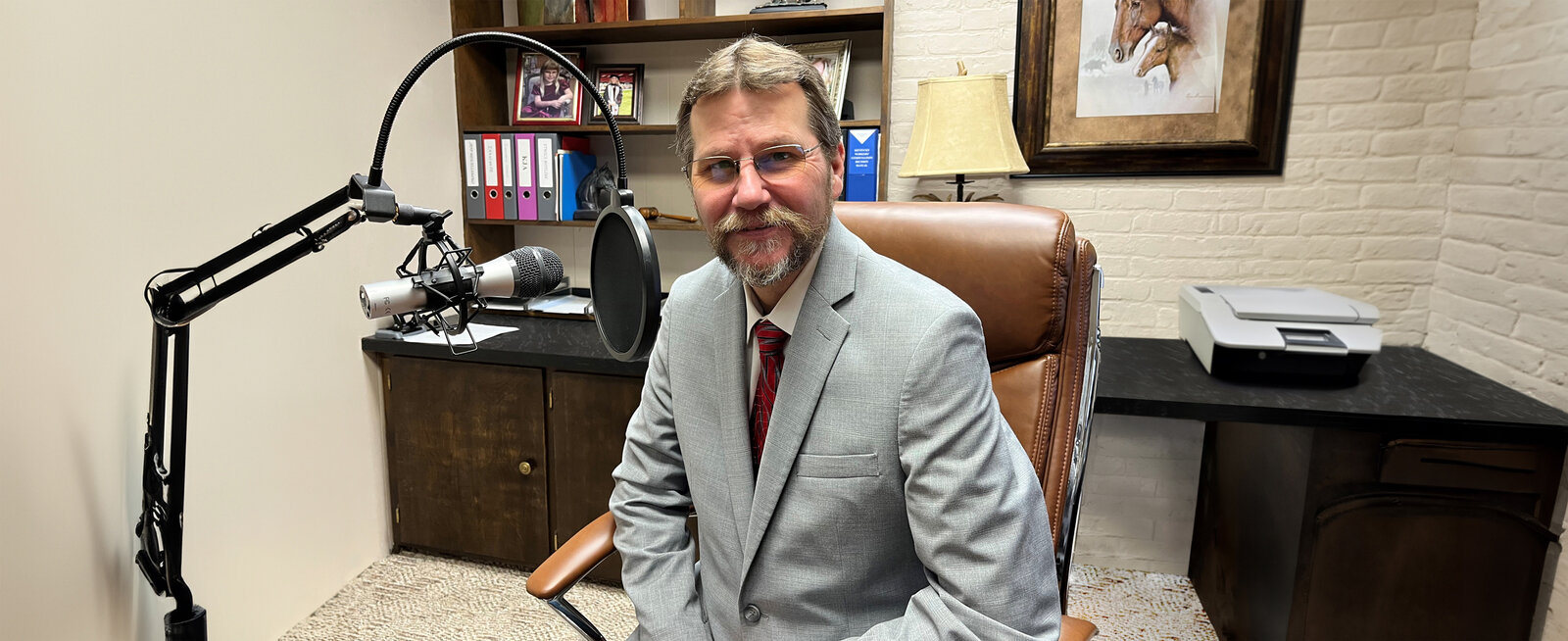Episode 55: Calloway County personal injury attorney Jeff Roberts explains a very important factor in your car wreck case, your workers’ comp case and also how it relates to your social security disability claim. The statute of limitations is exactly that – a limitation that may prevent you from being able to file a lawsuit. Jeff will walk us through this topic. It’s one every lawyer understands. Now, you will too.
What is the Statute of Limitations?
Jeff explains that this is a law that defines a specific timeframe during which you must file your lawsuit in court. If you don’t comply or your let this timeframe expire, you could be forever barred from pursuing your lawsuit.
An Affirmative Defense
If you’ve gone past the statute of limitations, you may still attempt to file the lawsuit, but the opposing attorney would normally raise this as a defense to your lawsuit. The court should agree and this would prevent the case from moving forward. Basically, you inadvertently let the time runout.

Do All Cases Have the Same Statute of Limitations?
Actually, no. In Kentucky, this timeframe will vary, depending upon the type of case. Jeff primarily handles personal injury claims. These include:
- Motor vehicle accidents (car, motorcycle and trunk collisions)
- Workers’ compensation claims
- Social security disability claims (SSDI and SSI)
- Medical negligence claims (“medical malpractice”)
- Premises liability claims
- Claims against municipalities
He’ll discuss how each of these have different clocks ticking and how he deals with them.
Statute of Limitations for Car Wrecks and other Motor Vehicle Accidents
In Kentucky, these are different from the normal personal injury claims. The statute of limitations is 2 years from the date of the collision or 2 years from the date of the last personal injury protection payment (“PIP” also called No-fault insurance).
Jeff has also discussed Uninsured Motorist (UM) claims and Under Insured Motorist (UIM) claims, in previous podcasts. When these claims are involved, he usually makes sure he files them using the same timeframe in the primary claim. While UM/UIM coverages are contracts, which usually have longer statute of limitations, Kentucky courts limit the timeframe to match the 2-year period used with the primary accident claim.
Should I Wait to File My Lawsuit?
While there is a specific timeframe available, Jeff discusses why preparing for a lawsuit is important. It can be to your advantage to contact an attorney as soon as possible. Your attorney will be able to assist with preserving your personal injury protection benefits (“PIP” benefits), in an effort to maximize your recovery. You may require extensive medical treatment or other issues related to your automobile accident. This does not prevent the clock from ticking. Even though you’re still getting treatment, the statute of limitations can expire, if you’re not careful.
Statute of Limitations for General Personal Injury Cases
In this segment, Jeff discusses medical negligence (“malpractice”), premises liability, dog bite claims and other non-motor vehicle cases. There’s a 1-year statute of limitations for these types of general injuries. There are ways to extend the timeframe, if they apply to your specific circumstance.
In medical malpractice cases, there is a “discovery rule.” Jeff explains that the statute of limitations begins when you discover the malpractice has occurred. He uses the example of a surgical sponge being left inside a patient. During post-op, this oversight may not be readily apparent. However, should an infection or some other issue lead to the discovery of the medical error, the point at which you knew or reasonably should have known of it starts the clock, even if it’s several years later.
Injuries Related to a Municipality
This might commonly occur with the condition of sidewalks and/or curbs, among other actions. A slip and fall inside a county building or court house is the same as a typically premises liability claim against a local retailer (i.e. Kroger, Walmart or Home Depot). There’s a 1-year statute of limitations.
However, lawsuits against a city involving defects in the street or sidewalk have a special limitation operating similar to a statute of limitations. The key is you are required to give notice to the city within 90 days. It must be done properly and to specific personnel or departments. If you go beyond the 90-day window, you’ve waived your claim.
Injuries Related to Premises Liability
As Jeff previously mentioned, there are cases when people slip in the aisle at a Kroger, Walmart or other retailer. This may be due to liquid soap or detergent that was spilled. There have been situations where items have fallen from high shelves resulting in head or neck injuries at a Lowe’s, Home Depot or Sam’s Club. The statute of limitations for these cases is 1-year.
Negotiations Begin Well-Before a Lawsuit Is Filed
Most injury claims are resolved before an actual lawsuit is filed with the court. An experienced personal injury attorney can gather the evidence and negotiate with the negligent party’s insurance adjuster. Even while negotiations are underway, the statute of limitations clock is still ticking
As an experienced trial attorney, Jeff Roberts knows he ultimately has the option of filing a lawsuit against the company. The insurance adjuster knows this as well. This is why many claims are actually settled. Trials involve a certain level of risk and the decision will be left up to a judge and jury. You may have more control during negotiations.
The final decision to settle or to pursue the lawsuit is ultimately left to the client. Jeff will advise the client as to the strength of his/her case, whether a good-faith settlement offer has been made by the insurance company, as well as other important considerations.
Statute of Limitations Claims Related to Workers’ Compensation
Jeff point out that Kentucky workers’ comp claims are handled as administrative law, which is different from the civil law cases he’s been discussing. The statute of limitations is 2-years from the date of injury or from the last payment of temporary total disability (TTD), which is paid during your medical treatment for the workplace injury.
Jeff clarifies that it’s also important to understand that simply because you’re receiving medical treatment, it does not mean your workers’ compensation claim has actually been filed in Frankfort. People often make this mistake. Until the appropriate Form 101 is filed in Frankfort, you’re still on the clock as it relates to the statute of limitations.
Occupational diseases are handled differently. These could be certain types of cancer or damage to internal organs from exposure at your workplace. The statute of limitations is generally 3 years. However, some occupational diseases, such as asbestos-related issues are extended significantly longer.
Occupational hearing loss occurs over time. However, once you’re able to determine your hearing loss is work-related, you should consult an experienced workers’ compensation attorney.
Social Security Disability (SSDI and SSI) Claims
These types of claims don’t have a specific statute of limitations. Social security disability (SSDI) is based on what you’ve paid into the system. If you meet the insured status requirements, you can file for SSDI benefits. Over time, you may be found to no longer have an insured status. If you fall outside of that period, you may still be able to file for Supplemental Security Income benefits (SSI).
If you are denied for SSDI or SSI, you only have a brief period of time to appeal the decision. This period is 60 days from the date you received the denial letter. It’s assumed you’ll receive it within 5 days of the date of the letter.
As we conclude this episode, it’s obvious that it can be a complicated issue. We hope you’ll seek out the advice of an experienced attorney for your specific circumstance. Jeff Roberts has a tremendous number of Google Reviews from people who have been extremely happy with the results they’ve had with Jeff. He invites you to take a few minutes to ready through them.
Jeff Roberts Represents Injured Clients Throughout Kentucky
With offices located in Calloway County and now Christian County, Jeff has a history of representing personal injury clients, workers’ compensation clients and social security disability clients across the state. He’s represented clients from Paducah, Bowling Green, Louisville, Covington, Whitesville and many other Kentucky locations. He’s not just a Western Kentucky injury attorney.
We hope you found this episode insightful and helpful. Thank you for listening!
Is It Time to Speak with an Attorney about Your Injury Claim?
The office phone number is (270) 753-0053 or toll free at 800-844-5108. For more information, visit www.JeffRobertsLaw.com. This podcast is meant to provide information and is not legal advice. Jeff’s principal office is located at 509 Main Street, Murray, Kentucky. Co-host Jim Ray is a non-attorney spokesperson. This is an advertisement.





